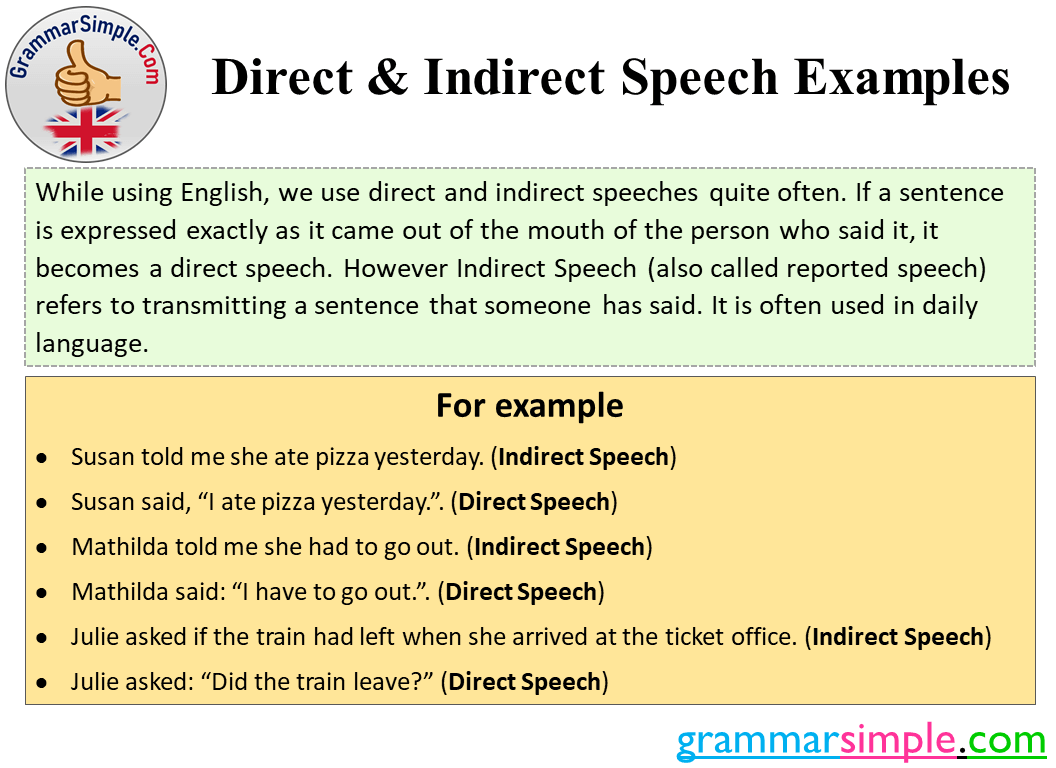What are Direct and Indirect Speech? Direct and Indirect Speech Examples


What are Direct and Indirect Speech? Direct and Indirect Speech Examples
Table of Contents
Direct And Indirect Speech Examples
While using English, we use direct and indirect speeches quite often. If a sentence is expressed exactly as it came out of the mouth of the person who said it, it becomes a direct speech. However Indirect Speech (also called reported speech) refers to transmitting a sentence that someone has said. It is often used in daily language.
For example,
- Susan told me she ate pizza yesterday. (Indirect Speech)
Susan said, “I ate pizza yesterday.”. (Direct Speech)
- Mathilda told me she had to go out. (Indirect Speech)
Mathilda said: “I have to go out.”. (Direct Speech)
- Julie asked if the train had left when she arrived at the ticket office. (Indirect Speech)
Julie asked: “Did the train leave?” (Direct Speech)
As you can see, in English, you can convey what someone tells you directly in quotation marks or indirectly with different words, pronouns, and suffixes without quotation marks. But there are certain rules in Indirect Speech.
Rules In Indirect Speech
In the use of indirect speech, what is said should be expressed by taking time a step back. In other words, the tenses in the sentence should be used like their 1st iteration past versions. Likewise, adverbs of time and pronouns need to be adapted.
Using Tenses
The most important point to consider when converting a sentence into reported speech is the tense. When converting the sentence, you need to express it over a past tense. Whatever tense direct speech is given, indirect speech must be expressed in the past tense of it.
Direct Speech Reported Speech
Present Simple Past Simple
Present Continuous Past Continuous
Present Perfect Past Perfect
Past Simple Past Simple/ Past Perfect
Past Continuous Past Continuous/ Past Perfect Continuous
Future Simple Would
Using Time Expressions
Time expressions and patterns that express time in indirect expressions should change in order to maintain the integrity of meaning, just like in tenses. Otherwise, not the time period mentioned by the original owner of the sentence, but the time period meant by the narrator can be understood. This would be wrong information.
Direct Speech Reported Speech
Now Then
Today That day
Tomorrow The next day/ The following day
Yesterday The day before/ The previous day
This That
These days Last days / The previous days
Next weekend The weekend after / The following weekend
Use of Pronouns
What should not be forgotten about reported speech is the basic logic of indirect speech. Since the transfer is indirect in indirect speech, personal pronouns and possessive pronouns differ from direct speech.
For example, indirect speech, the subject, which is first person singular (I) in the quoted sentence, will turn into third-person singular (he-she) in indirect speech, due to the natural flow of the language.
Just as with personal pronouns, it is the same with possessive pronouns and possessive adjectives.
Examples:
- Julia said, “I need to be on time”.
- Julia said that she needed to be on time.
- Jonathan said, “We don’t like that movie.”.
- Jonathan said that they didn’t like that movie.
Recent Posts
Use Rose in a Sentence, How to Use Rose with Example Sentences
Use Rose in a Sentence, How to Use Rose with Example Sentences
Use Yourself in a Sentence, How to Use Yourself with Example Sentences
Use Yourself in a Sentence, How to Use Yourself with Example Sentences
Use Picture in a Sentence, How to Use Picture with Example Sentences
Use Picture in a Sentence, How to Use Picture with Example Sentences
Use Claim in a Sentence, How to Use Claim with Example Sentences
Use Claim in a Sentence, How to Use Claim with Example Sentences
Use Treasure in a Sentence, How to Use Treasure with Example Sentences
Use Treasure in a Sentence, How to Use Treasure with Example Sentences
Use Raise in a Sentence, How to Use Raise with Example Sentences
Use Raise in a Sentence, How to Use Raise with Example Sentences